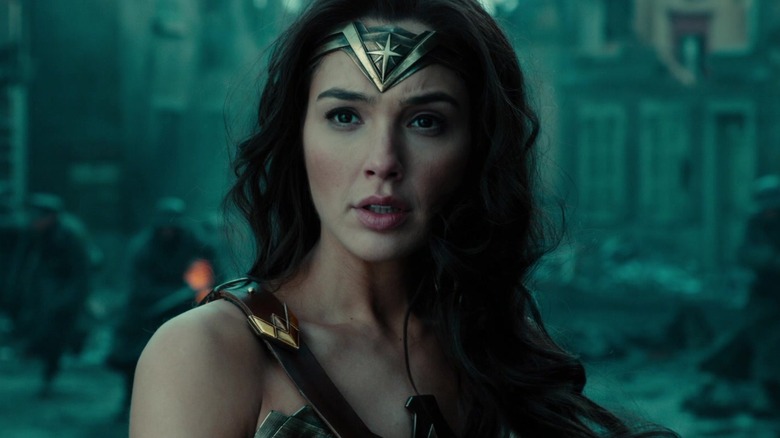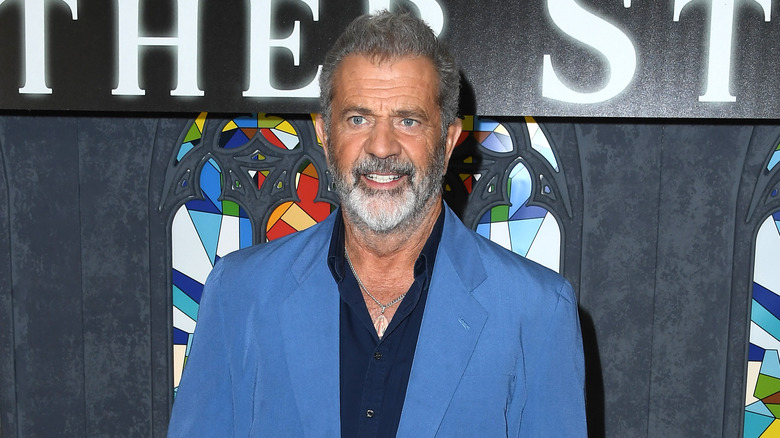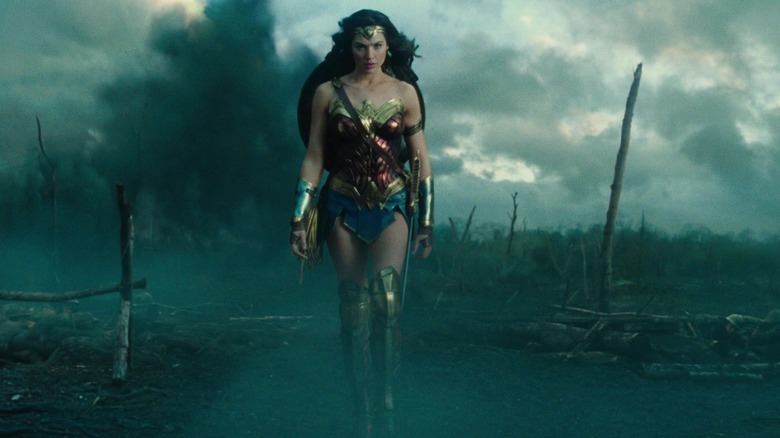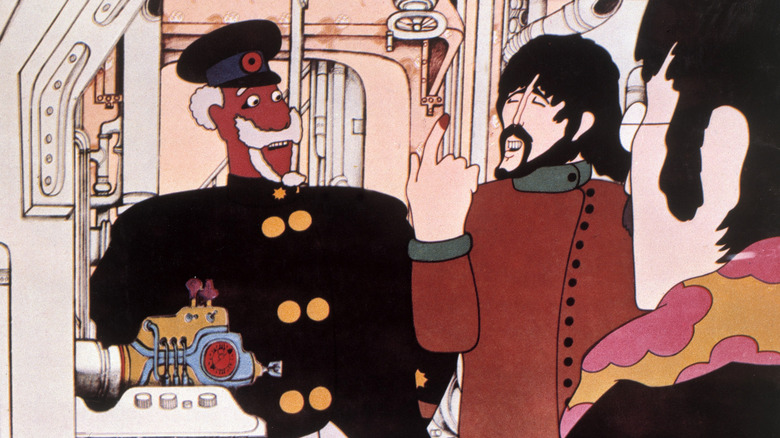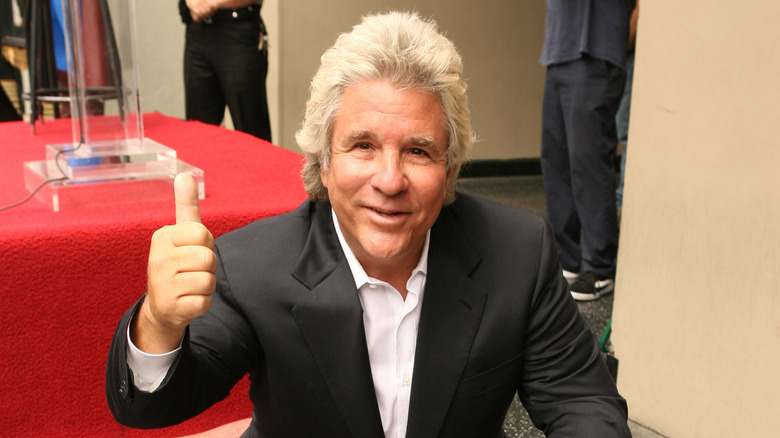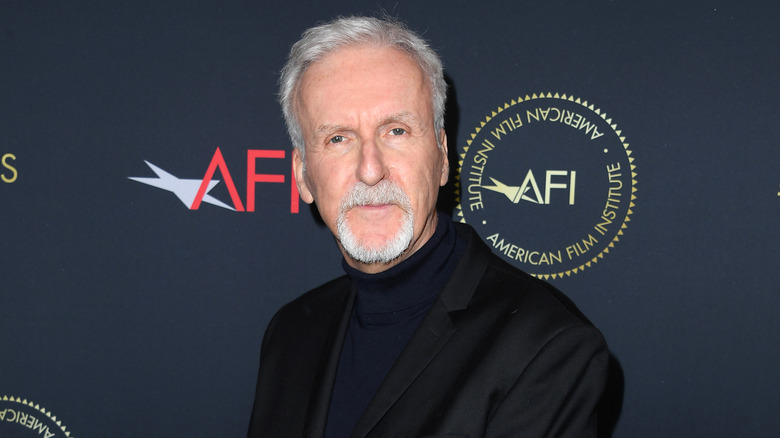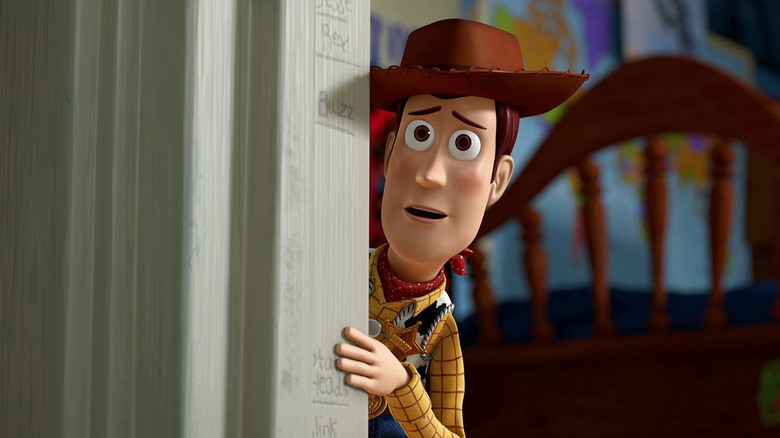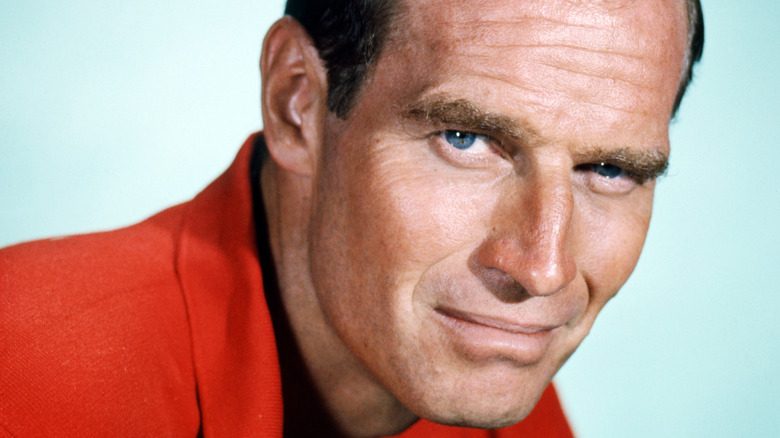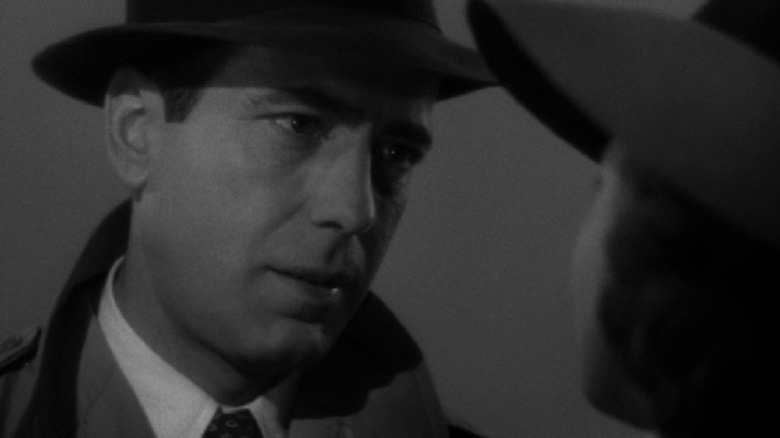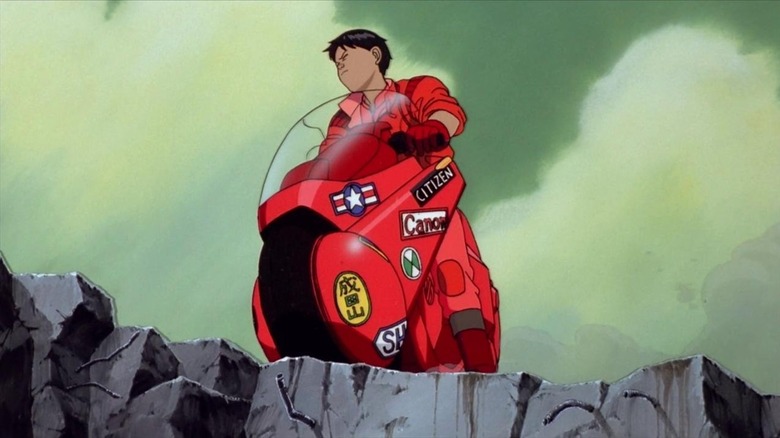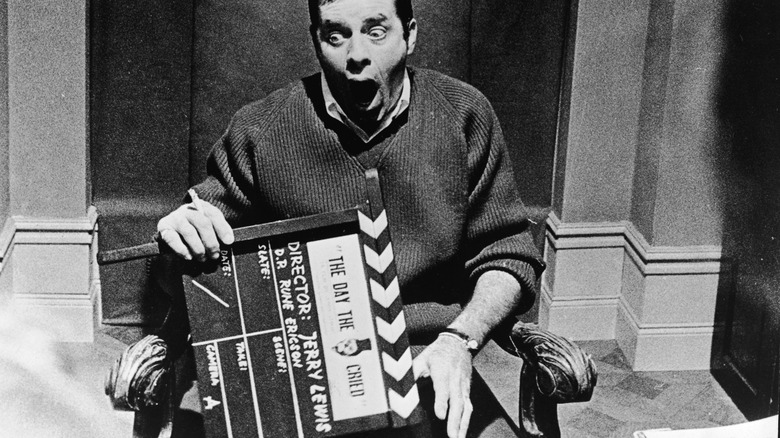Canceled Movies We're Glad Didn't Get Made
The history of film is filled with ambitious projects that for various reasons never got made. Looking over this history, there's an understandable tendency to focus on the abandoned movies that we wish had been finished and released. We sympathize with artists who weren't given a full chance to realize their vision. Some of these canceled movies become the stuff of legend, and on rare occasions, these lost visions get the chance to become fully realized and celebrated — the posthumous restoration of Orson Welles' "The Other Side of the Wind," for instance, or "Guillermo Del Toro's Pinocchio" finally escaping development hell.
For every promising film that Hollywood has pulled the plug on, however, there are even more that never got made simply because they were terrible. In some cases, the central ideas themselves were problematic, while in other cases, concepts with potential nearly got wasted on talent whose style and vision were comically ill-suited to the material they were working with. We take a look back at some of the more infamous canceled films that we're glad didn't get made.
Mel Gibson's Maccabees
Few movie stars have been given as many undeserved second chances as Mel Gibson. One of Gibson's many comeback attempts that we can be grateful never came to be was a movie about the Maccabees, the 2nd-century Jewish rebels whose war against the Seleucid Empire is the basis for the holiday of Hanukkah. You don't have to delve too deep into Gibson's problematic behavior to know that this would have been an absolute disaster had it been greenlit.
Screenwriter Joe Eszterhas of "Basic Instinct" and "Showgirls" infamy was working on the script, which ultimately got shelved by Warner Bros. in 2012 due to criticism from Jewish groups. In a letter addressed to Gibson and published by The Wrap, Eszterhas describes many instances of Gibson being antisemitic, expressing horrifying violent thoughts about his ex-girlfriend Oksana Grigorieva, and traumatizing Eszterhas' wife and son. The script for the Maccabees movie may have been written with the purest of intentions, but according to the screenwriter, Gibson's interest in it was a mix of self-serving deflection from the press about his antisemitism and an illogical attempt to try to get Jews to convert to Christianity.
If you or someone you know is dealing with domestic abuse, you can call the National Domestic Violence Hotline at 1−800−799−7233. You can also find more information, resources, and support at their website.
Joss Whedon's Wonder Woman
Not so long ago, this project was one that fans desperately wished could have been made. Joss Whedon was geek royalty in the 2000s and early 2010s, and the girl power of "Buffy the Vampire Slayer" had given him a reputation as a progressive pop culture feminist. Warner Bros., meanwhile, was continually struggling to get a Wonder Woman movie off the ground despite the character's immense popularity and cultural significance. In 2007, the news broke that executives had rejected Whedon's "Wonder Woman" script, and it sounded like a classic case of an artist getting screwed over by the suits.
Then in 2017, around the same time as the release of Patty Jenkins' successful "Wonder Woman" movie, Whedon's "Wonder Woman" script leaked online — and everyone realized it was terrible. Focused more on Steve Trevor than Diana of Themyscira, and filled with cringy, casually sexist dialogue, the script was a clear illustration of the flaws in Whedon's general writing style that the fandom hadn't perhaps noticed before. Whedon's handling of the character — and reported mistreatment of actress Gal Gadot in his widely despised 2017 version of "Justice League" — serves as further evidence that he was not the best choice to do a "Wonder Woman" movie.
Robert Zemeckis' Yellow Submarine
George Dunning's 1968 animated movie "Yellow Submarine" has the flimsiest of stories, but the combination of hyper-stylized psychedelic animation coupled with music by The Beatles makes for a delightful viewing experience. It's also a movie so of its time and place that it seems completely pointless to remake — especially if said remake was to use realistic motion capture, completely negating the cartoony appeal of the original. For some inexplicable reason, Disney and Robert Zemeckis' studio ImageMovers Digital attempted to do just that.
Looking through the concept art for the unrealized remake and everything that was once cute and silly in the original becomes actual nightmare fuel. Disney ended up rejecting the "Yellow Submarine" remake about a year and a half before its intended summer 2012 release date. Zemeckis was free to shop the remake to other companies, but ultimately the director gave up. This was clearly a smart decision on Disney's part given that audiences widely rejected the similar stylings of the Zemeckis-produced 2011 bomb "Mars Needs Moms."
Jon Peters' Sandman
Long before a contemporized but mostly hyper-faithful adaptation of Neil Gaiman's "Sandman" comics became a hit series on Netflix, multiple filmmakers tried their hand at bringing the Endless to the big screen. Some of these attempts — like the version written by Ted Elliott and Terry Rossio (writers of "Shrek" and "Pirates of the Caribbean") — could have been something great. One such adaptation, however, proved so horrible that Gaiman himself had to go to unorthodox lengths to prevent it from getting made.
This terrible script was set to be produced by Jon Peters, the hairdresser-turned-movie mogul. Peters is infamous for, among other things, forcing giant mechanical spiders into films such as "Wild Wild West," and the canceled Tim Burton-directed "Superman Lives." Peters' planned "Sandman" adaptation was also poised to feature a machine-like arachnid, as well as a nonsensical plot in which Morpheus, Lucifer, and the Corinthian were identical triplets racing to collect objects of power before midnight on New Year's Eve.
In an interview with Rolling Stone, Gaiman called it "the worst script I've ever read." In this interview, the author admitted to leaking the script to then-influential movie geek website Ain't It Cool News, which gave it an equally savage review and ultimately killed its chances of going forward.
James Cameron's Spider-Man
On paper, this sounds like it should have been a good idea. Spider-Man is awesome, and James Cameron has helmed some of the biggest blockbusters of all time, so shouldn't a James Cameron Spider-Man movie be a match made in heaven? You'd think that, but judging by Cameron's unmade treatment for the film from 1993, it seems this would have been a case of two great tastes that don't taste great together.
The major issue with Cameron's treatment is that it's ridiculously dark. This version of Peter Parker — set to be played by Leonardo DiCaprio — wasn't your friendly neighborhood Spider-Man but instead a remorseless killer. Add in some weird casting choices — including Arnold Schwarzenegger as Doc Ock and Kevin Spacey as the Green Goblin – plus the still-limited state of special effects in the early '90s, it is probably for the best that we never got to see this film. Cameron had also intended the climax to be atop the World Trade Center towers — an idea that would have been instantly dated following the September 11 attacks — so we can be thankful that legal issues ended this production and Sam Raimi's 2002 movie ended up being Spider-Man's big screen debut instead.
Max Landis' Pepe Le Pew
Here's an example of how dramatically the culture can change in just a few years. In the 2020s, the amorous French skunk Pepe Le Pew is effectively banned from appearing in new "Looney Tunes" cartoons because the character's only joke is based around sexual harassment. A scene trying to make fun of his problematic nature got cut from "Space Jam: A New Legacy," and Pepe was last seen on-screen being erased from existence in an episode of the "Animaniacs" reboot.
This makes it all the more shocking to realize that Warner Bros. spent much of the previous decade trying to give Pepe Le Pew his own feature-length movie. In 2010, Mike Myers was announced to be voicing the skunk for a live-action/CG hybrid movie. Warner Bros. was still working on this film as recently as 2016, when a screenplay was written by Max Landis. Considering Landis already had a history of public misogynistic statements at the time, and that multiple women have accused Landis of sexual assault and abuse in the years since, this would have made for a particularly disturbing match.
If you or anyone you know has been a victim of sexual assault, help is available. Visit the Rape, Abuse & Incest National Network website or contact RAINN's National Helpline at 1-800-656-HOPE (4673).
Toy Story 3 without Pixar
The "Toy Story 3" that hit theaters in 2010 is rightfully celebrated as one of the best sequels ever made and among the best Pixar movies. Its legacy as a powerful end-of-childhood tearjerker makes it easy to forget that in the days before Disney officially bought Pixar, news about "Toy Story 3" sounded less like a promise and more like a threat because Disney was trying to make "Toy Story 3" without Pixar.
Before his ousting in 2005, then-Disney CEO Michael Eisner set up the Circle 7 animation studio for the purposes of developing direct-to-video sequels to the movies Pixar had previously made for Disney. A few plots were cycled through for another "Toy Story" sequel, including the toys solving a murder mystery in Andy's grandma's attic and Buzz being recalled to a toy manufacturing plant in Taiwan.
Fortunately, Eisner's departure from the company and Disney's subsequent acquisition of Pixar put a stop to this project and Pixar got to develop its own "Toy Story 3" for theaters. Circle 7 was also developing DTV sequels for "Monsters Inc." and "Finding Nemo" — movies that also ended up getting proper high-quality theatrical Pixar follow-ups in the form of the prequel "Monsters University" and the sequel "Finding Dory" respectively.
Malcolm X starring Charlton Heston
Spike Lee's 1992 epic "Malcolm X" — starring Denzel Washington as the controversial civil rights leader — is one of the rare biopics to rise above the genre's cliches and stand as a great film in its own right. Interestingly, Lee's screenplay was a rewrite of a much older draft written by James Baldwin and Arnold Perl in 1968. Had the script been produced back then, there's good reason to suspect the movie would have been a total disaster.
Baldwin, a friend of Malcolm's, was an inspired choice to be the screenwriter, but the executives at Columbia Pictures didn't give him any support to let him tell the story accurately. Baldwin wanted Billy Dee Williams in the lead role, but the studio reportedly wanted Charlton Heston in blackface. There's not much you can say about such a boneheaded racist concept beyond what Baldwin himself said about quitting the project: "I didn't want to be a part of a second assassination."
Rub & Tug starring Scarlett Johansson
A more recent example of tasteless casting choices ruining a potentially promising movie idea, "Rub & Tug" was set to be a biopic about Dante "Tex" Gill, a transmasculine gangster and massage parlor owner. In 2018, Scarlett Johansson was signed on to play Tex — a questionable decision, to say the least, at a time when the trans community was being increasingly vocal about wanting trans actors to be cast in trans roles.
Johansson withdrew from the role shortly after her casting was announced, though this didn't stop her from making a laughable defense of this casting — as well as of the similarly controversial casting of her playing a Japanese character in 2017's live-action "Ghost in the Shell" remake. Speaking to As If Mag a year later, Johansson said, "As an actor, I should be allowed to play any person, or any tree, or any animal because that is my job and the requirements of my job."
A better version of "Rub & Tug" might still eventually get produced. In 2020, "Transparent" writer Our Lady J was announced to be developing the story as a TV series, with the promise to cast a trans man to play Tex. However, no news about the show has been reported since.
Return to Casablanca
When thinking of classic movies that absolutely do not need sequels, "Casablanca" is pretty high on the list. Its story is complete, its ending is perfect, and any attempt to recapture the lightning in a bottle that made it so great would seem destined to fail. However, that certainty of failure hasn't kept people from trying.
One such sequel idea titled "Brazzaville" — set in the French city that Rick Blaine and Captain Renault announced plans to visit at the end of "Casablanca" — was announced in 1943 but never got made. Howard Koch, one of the original film's screenwriters, later wrote a treatment for a sequel titled "Return to Casablanca" in 1980. Cass Warner attempted to get this produced in 2012 but it also ended up nowhere. While having one of the original writers involved was a point in its favor, the plot description — centered around Rick and Ilsa's illegitimate son searching for his dad — sounds like the epitome of an unnecessary legacy sequel.
Every live-action Akira attempt
Live-action anime adaptations have a mixed track record at best when it comes to quality and a downright terrible track record when it comes to actually getting made. One such adaptation that's been stuck in development hell is the Warner Bros. remake of "Akira."
It's not as if the idea of remaking "Akira" is in and of itself sacrilege. After all, Katsuhiro Otomo's original manga is different enough from the anime movie that there's room for another adaptation. Doing a remake in live-action, however, seems a bit more questionable, given the special effects budget that would be needed to do the story justice. Furthermore, doing an American remake just brings more problems, both in terms of adapting the manga's very Japanese cultural concerns and in terms of the high risk of the characters being whitewashed — as was the case with "Ghost in the Shell" in 2017.
Filmmakers who've tried and failed to get the Hollywood "Akira" made include Stephen Norrington, Ruairí Robinson, the Hughes brothers, and Jaume Collet-Serra. Additionally, George Miller and Jordan Peele – two of the only filmmakers who might be able to pull off a live-action "Akira" — both said no to the job. Most recently, Taika Waititi has been attached to the project. His refusal to whitewash the cast is a positive sign, but "Akira" still seems like an odd fit for a director most skilled at comedies — plus Waititi is booked for many other films, which puts "Akira" on the back burner.
Jerry Lewis' The Day the Clown Cried
"The Day the Clown Cried" is the movie on this list that actually got closest to being released — and an unfinished cut of the 1972 production will get a release of sorts sometime in 2024 via the Library of Congress. Given the mystique that's been built up around this legendarily awful Jerry Lewis comedy, a lot of film and comedy geeks are sure to be interested in checking it out when they finally have the chance, but it's probably a good thing it didn't get released before now.
For those who don't know, "The Day the Clown Cried" is about a circus clown in Nazi Germany who gets sent to a concentration camp. The concept is somewhat similar to the popular but controversial 1997 film "Life Is Beautiful," and some have made comparisons between the two. Whatever you may say about "Life Is Beautiful," however, it at least doesn't end with the clown character leading Jewish children into the gas chambers and then joining them out of guilt — yes, that really is the ending.
It's no surprise that Lewis didn't want this cinematic train wreck to see the light of day in his lifetime. The few who have had the chance to watch the rough cut have been effusive about just how astonishingly and amazingly terrible it is, and even "Animaniacs" did an episode making fun of it.
